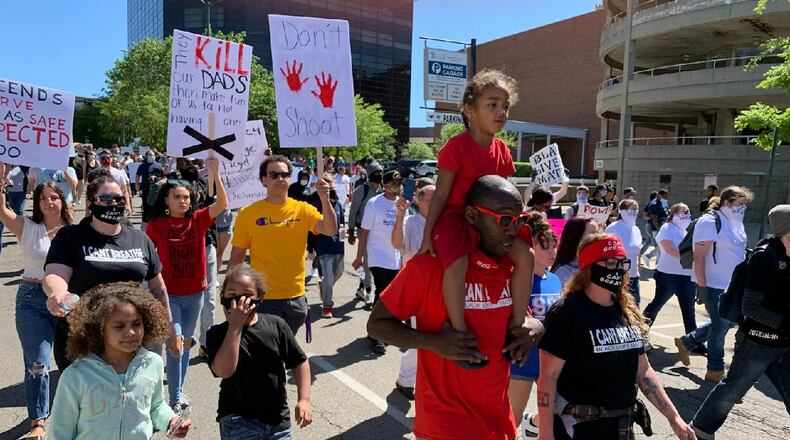The area saw several marches following Floyd’s death on May 25, 2020, including one in which hundreds gathered in downtown Springfield in a show of solidarity with those across the country protesting racial injustice.
Marches also occurred in other parts of Clark County, including one in New Carlisle that saw dozens of people participating.
In addition to that, Springfield City officials released statements condemning Floyd’s death and pastors addressed their congregations about the reality of racism in the county.
“The (chief of the Springfield Police Division) has made clear that what happened in Minneapolis is contrary to the policy of the city of Springfield’s police department,” Springfield Mayor Warren Copeland said at the time.
“We do not want our officers acting in that way and we will discipline them if they do. This is not what the City of Springfield should expect from their police and we do not expect it from public officials,” he added.
Conversations about race and inequity continued throughout most of 2020 as community leaders had public discussion centered around issues facing minority communities in Clark County and law enforcement advisory teams were either created or revamped.
Floyd’s death had renewed conversations about police brutality and systemic racism in the country. The incident had been filmed and that footage was shared all over social media sties.
An officer identified as Derek Chauvin was filmed kneeling on Floyd’s neck for over nine minutes. Floyd was handcuffed and held down by several police officers during his arrest.
For Denise Williams, the president of the Springfield unit of the NAACP, Floyd’s death highlighted fears that she says many Black people have in the country when it comes to policing.
“It was right in our faces. We saw it in real time. George Floyd represented all of our sons. It made us fear that our sons could be the next George Floyd,” Williams said.
She said the incident was a reminder for many that the country still has a long way to go in terms of addressing systemic racism.
The protests that followed sparked dialogues regarding relationships between police and minority communities in the country, as well as disparities in housing, education and healthcare.
“It just did not have a huge impact on the black community but also had an impact on the white community,” Williams said, noting the multi-racial character of the protests nationwide as well as locally.
Carl Ruby, who is a white pastor in Springfield, said that it is very important for white members of the community to take part in conversations regarding racial injustice.
Ruby said it offers a chance for white people to listen to people of color who share their experiences. He said for some white people, they may not be aware of those realities and the protest and discussions that followed Floyd’s death served as a wake up call.
“Racism in America is going to continue until white people decide it needs to stop,” he said noting power imbalances in the country that disproportionally favor white Americans.
“We can no longer allow this to happen and if we are silent this will continue. If we remain silent, we are complicit,” he added, noting the importance of elevating the voices of those who face marginalization.
Ruby’s congregation was part of a multi-racial march that took place in Springfield last year that aimed to raise awareness to racial injustice in the country. The march took place in June and was lead by local faith based leaders.
Local pastors addressed the crowd about the importance of addressing systemic racism as well as being part of the change. They said that the system needed to be reformed and changed in order to stop injustices from occurring.
Flyers handed out during the march stated an intent to demonstrate “our commitment to prayer and action for unity, peace, justice, harmony and love in the midst of racial and ethnic tensions.”
“We want churches of all ethnicities to come together and speak out about the injustice that has been prevalent for centuries in this country,” Ernest C. Brown Sr., the senior pastor at St. John Missionary Baptist Church in Springfield, said at the time.
Some members of those faith-based originations also participated in a town hall discussion in September that also included Springfield government officials, a Clark County commissioner, the Clark County sheriff as well as educators and members of non profits.
The discussion did not just focus on policing or police brutality, but it also focused on disparities in education, housing, transportation and healthcare.
It was organized and moderated by Springfield resident Lauren Kelley, who formed the group Leaders of Change that year.
She said that it was not only important to continue to have these types of conversations but also to hold local leaders and the community accountable in taking action.
Williams said a year after Floyd’s death commitment to change needs to continue as she said this country still has a long way to go in addressing those issues.
“I don’t see this dying out. I am sick and tired of talking about race. What are we going to do about it. We need to change the mindset of people. We can’t continue to just only talk about it. We need tangible actions that will bridge the racial divide in this country,” she said.
Williams said that progress has been made over the decades and she has felt more accepted in recent years. But she said that many Black people still feel the weight of causal racism in their daily lives whether that be how they are perceived by others, incidents of profiling or subtle comments made towards them.
She said when high profile incidents occur nationally involving unarmed Black people being killed by police, it heightens those feelings of marginalization.
Williams said that is because in a lot of cases there seems to be a lack of accountability or it furthers the belief that officers involved in those cases are not facing adequate consequences.
Chauvin was convicted last month of second-degree unintentional murder, third-degree murder and second-degree manslaughter in relation to Floyd’s death.
But Williams said that in order for true justice to occur what happened to Chauvin needs to be the norm and not the exception.
She said that though issues related to policing may be different depending on where you live, it is important to have these conversations with local law enforcement none the less in order to build or maintain trust and transparency.
The protests and the issues fueling them also spurred the creation of two local law enforcement advisory teams that aim to provide additional community oversight in regards to policing as well as provide education and outreach.
The Clark County Law Enforcement Advisory Team is working with the Clark County Sheriff’s Office and the Community Police Advisory Team is working with the Springfield Police Division.
The idea is to have members of the community who will serve as an additional voice of input regarding law enforcement training, policy as well as looking at ways to make sure people are being held accountable and there is an increase in transparency.
Those advisory teams have been formed and are in the early stages of their work as they engage in dialogue and familiarize themselves with the intricacies of policing, said James Bacon, the chairperson for the Community Police Advisory Team in Springfield.
Timeline
May 25, 2020 -George Floyd is killed while in Minneapolis police custody
May 31, 2020- Hundreds gathered in downtown Springfield to protest Floyd’s death
Aug. 11, 2020 - City of Springfield takes steps to revive Community Police Advisory Team
July 22, 2020 - Clark County commissioners create law enforcement advisory team
April 20, 2021 - Derek Chauvin convicted of murder, other charges related to the death of George Floyd
About the Author

